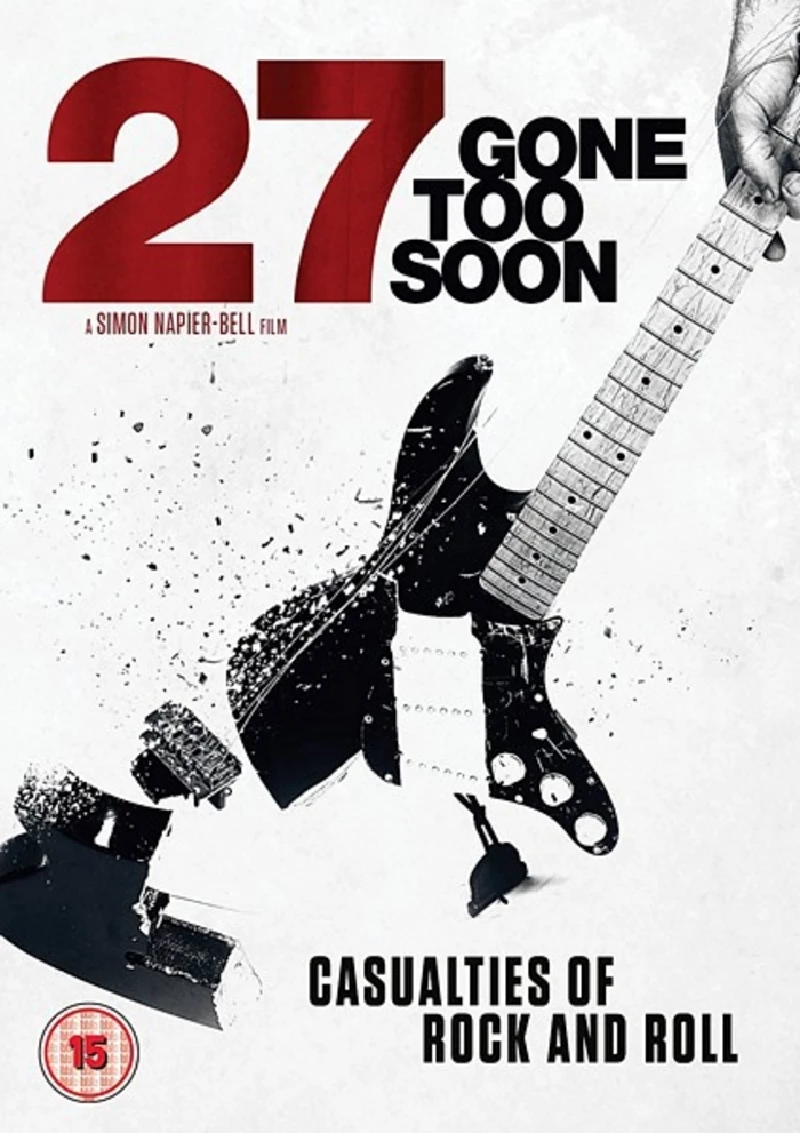Miscellaneous - 27: Gone Too Soon
by Fiona Hutchings
published: 26 / 3 / 2018

intro
The 27 Club has its own sort of exclusivity but what does it take to end up a member? Fiona Hutchings is left wondering where we place the blame in Simon Napier-Bell's new documentary film, '27: Gone Too Soon'.
The myth of the 27 Club seems to have been established quickly and with a very small body of evidence to support it. The deaths between 1969 and 1971 of Brian Jones, Jimi Hendrix, Janis Joplin and Jim Morrison all at the age of 27 seemed to strike an immediate link between the idea of the troubled musician and an early death. Twenty-three years later Kurt Cobain bought entry to the club with a gun. The sixth member profiled in Simon Napier-Bell's film is Amy Winehouse, who, like the others seems to have sacrificed life in a blaze of destructive, often public addictions while trying to find some degree of private relief. Wikipedia actually lists a lot of other musicians who died at age 27 but few had the fame and hypnotic charisma of this sextuple. Plus we start the film with more stats. Expand your search to those who have died in the field of popular music at the height of their fame before the age of 35 and there is well over a thousand musicians. I guess the 35 and Unders Club doesn't hold the same mystique and glamour. So before the opening titles have finished I am a little perplexed. Is this documentary going to tell me the 27 Club is an over inflated myth, as substantial as dry ice? And even if it does will I believe it? No. And no. The film is a little chaotic in its own way. An eclectic combination of talking heads ranges from Gary Numan via various psychologists, record label employees, authors, and a lawyer to Dave Ambrose. Of course, Paul Gambaccini is here too and offers his own experiences and thoughts with the measured wit we have come to expect. Cut in between these interviews is a dizzying array of footage that illustrates our story sometimes more literally (news clips, performances and interviews with our club members) and sometimes things take a more lateral mind bending direction. A word to the squeamish, if needles make your knees knock there are multiple shots of drawing and injecting. We don't have a narrator guiding proceedings but from the off the images and thoughts offered combine to lay out the basics of the 27 Club, the wider contexts it rose from which our stars all share to a least some degree alongside each individual story. The recurring question seems to be who is ultimately responsible? The record company exploiting the pain rooted in childhood that captivates fans and makes them a lot of money? Are mental illness and music so closely entwined they can't be separated? Maybe we aren't as captivated by well adjusted, sober musicians? Did the Rolling Stones break Brian Jones? How did no one hear Joplin's primal scream for the cry for help it perhaps was? As for Amy Winehouse, the anger and disgust at her father's actions (and lack of action too) is palpable and in my opinion entirely warranted. A minute in and the music industry is termed exploitative, and it is here to which we return at the end to ask. Do labels sacrifice the sanity and sometimes lives of their artists by putting profits over providing support and a break from the limelight? One question that is never asked is if we, as music fans, bare some of the responsibility too. Maybe that would be just too uncomfortable. But if something about fame can mean paying the ultimate price for being on the pedestal where does the blame lie? Aren't we the ones that put them there? Director Simon Napier-Bell is more than overly qualified for the job he has taken on here. He's been a songwriter, a music manager and record producer among other things and perhaps our selection of interviewees have been plucked from his undoubtedly full little black book. The finished product is tight, absorbing, avoids cliche and sensationalism and leaves the watcher with a lot of questions of their own to ponder.
most viewed articles
current edition
Screamin' Cheetah Wheelies - Sala Apolo, Barcelona, 29/11/2023 and La Paqui, Madrid, 30/11/2023Anthony Phillips - Interview
Difford and Tilbrook - Difford and Tilbrook
Rain Parade - Interview
Oldfield Youth Club - Interview
Autumn 1904 - Interview
Shaw's Trailer Park - Interview
Cafe No. 9, Sheffield and Grass Roots Venues - Comment
Pete Berwick - ‘Too Wild to Tame’: The story of the Boyzz:
Chris Hludzik - Vinyl Stories
previous editions
Microdisney - The Clock Comes Down the StairsWorld Party - Interview
Heavenly - P.U.N.K. Girl EP
Michael Lindsay Hogg - Interview
Ain't That Always The Way - Alan Horne After The Sound of Young Scotland 2
Joy Division - The Image That Made Me Weep
World Party - Interview with Karl Wallinger
Dwina Gibb - Interview
Barrie Barlow - Interview
Prisoners - Interview
most viewed reviews
current edition
Marika Hackman - Big SighSerious Sam Barrett - A Drop of the Morning Dew
Rod Stewart and Jools Holland - Swing Fever
Ian M Bailey - We Live in Strange Times
Loves - True Love: The Most of The Loves
Paul McCartney and Wings - Band on the Run
Autumn 1904 - Tales of Innocence
Roberta Flack - Lost Takes
Banter - Heroes
Posey Hill - No Clear Place to Fall
Pennyblackmusic Regular Contributors
Adrian Janes
Amanda J. Window
Andrew Twambley
Anthony Dhanendran
Benjamin Howarth
Cila Warncke
Daniel Cressey
Darren Aston
Dastardly
Dave Goodwin
Denzil Watson
Dominic B. Simpson
Eoghan Lyng
Fiona Hutchings
Harry Sherriff
Helen Tipping
Jamie Rowland
John Clarkson
Julie Cruickshank
Kimberly Bright
Lisa Torem
Maarten Schiethart